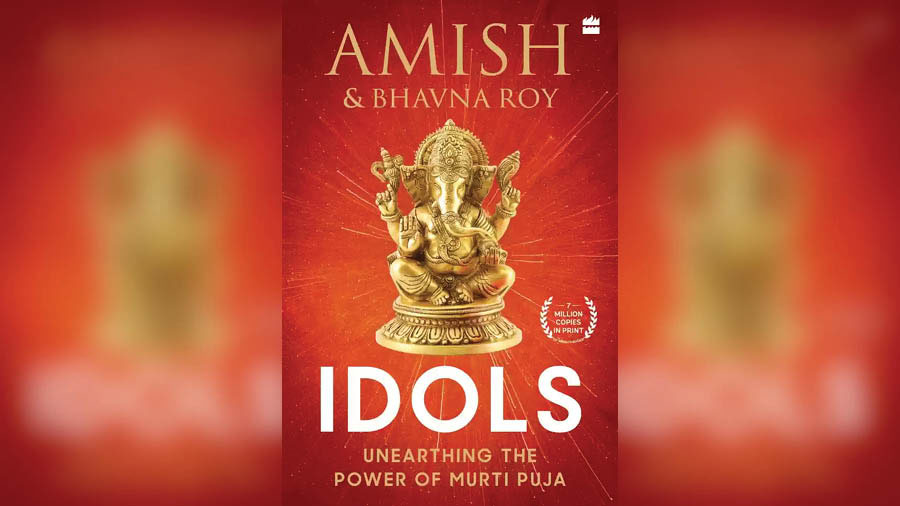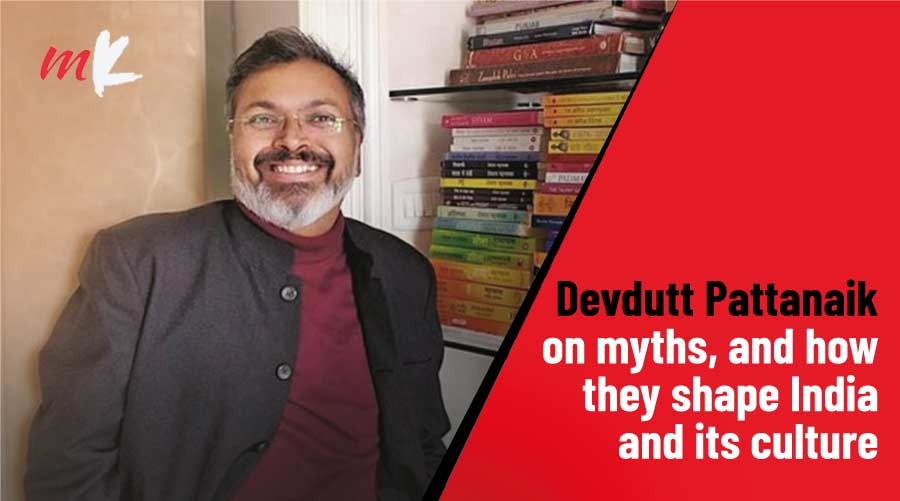There are many sides of Amish Tripathi worth talking about. There was the young Amish who was raised in Odisha’s boarding schools and St. Xavier’s College, Mumbai; Amish, the banker and finance marketing product manager; Amish, who almost single-handedly pioneered India’s mythological fiction scene through his celebrated Shiva Trilogy; and the Amish who was appointed for diplomatic duty in London as minister of culture and education at the Indian High Commission and director of the Nehru Centre, until his tenure expired this year.
Amish recently released a book called Idols (2023), co-authored with his elder sister, Bhavna Roy. During the promotion of this book, Amish famously (or infamously) declared himself a “proud idol worshipper”. My Kolkata caught up with Amish as well as Bhavna on the sidelines of the Bangalore Literature Festival to discuss Idols and idol worship and get a sense of how both authors approach religion and spirituality.
A book like ‘Idols’ is hard to find on the contemporary Indian bookshelf

Amish and Bhavna Roy first began work on a project that eventually turned into ‘Idols’ in 2012
TT archivesThe plot of Idols is rather bare-bones, and probably not the point of the book. It can be summed up in a sentence — a character is admitted to a hospital and, while being bedridden, engages his family and friends in conversations regarding the nature of idol worship.
The dialogues are the crux of Idols. The book is largely structured as a Socratic samvad, and follows the heritage of the Upanishads and Plato’s Republic. A point is made, a counterpoint is offered and, soon enough, the fundamentals of idol worship (or, indeed, those of Hindu Sanatan Dharma) are explored until things threaten to devolve into infinite regress.
Dialogic books have fallen out of fashion. A book like Idols is hard to find on the contemporary Indian bookshelf. But neither Amish nor Bhavna are strangers to this writing style. Indeed, their previous project, Dharma: Decoding the Epics for a Meaningful Life (2020), also followed a similar dialogic structure. “In fact, it was a common project,” Bhavna revealed. “One manuscript was divided into two. One for Dharma and one for Idols.”
‘Amish had pulled me out of high depression’
The joint project began around 2012, but was put on hold when Bhavna’s husband, Himanshu Roy (former joint commissioner of Mumbai), contracted cancer in 2016. Himanshu committed suicide two years later, which sunk Bhavna into a dark and depressed state.
“A month after the Covid-19 lockdown began, Amish called me up,” Bhavna reccalled. “He said: ‘Didi, do you remember that project we were working on? Let’s resume it.’ I sank myself into the manuscript like the lifeline it was. Amish had pulled me out of high depression.” Along with being writer and IAS officer, Bhavna is also the director of the Himanshu Roy Foundation, set up in 2019. The Foundation works in the field of cancer besides promoting the late Himanshu’s interests in Hindustani and Carnatic classical music. “Himanshu was a super cop, but his soul was with Bhavna didi. And classical music,” Amish said.
The philosophy of idol worship

‘Idols’ was published by HarperCollins in October
Idol worship is a tricky thing to endorse in modern India. Especially when one sees the sorry state of Kolkata traffic after endless immersions of Ma Durga. Or the furore behind Lord Ganesha’s drinking milk miracle, which led to a lot of wasted milk and was later explained by a simple scientific concept called the capillary effect. Amish contends that the problem is less with idol-worship itself and much more with extremism and the perversion of ancient values in modern India. “Our ancient way of life was built around dharma; around the temple,” Amish said. “If the temple was at the centre of a settlement, a big road went through the heart of the city, where Rath Yatras were carried out. That built a good infrastructure. There were also ponds in every temple. That was a way to ensure water was stored for the entire locality. Our art was also built around the temple, which meant there was a sense of humility and togetherness that came out in art.”
Amish asserted that the Indian subcontinent is in a troubled state today, following a thousand years of invasions. “Today is not us at our best,” he said, perhaps agreeing that there were some forms of contemporary idol worship that brought more harm than help. “Most ancient ways of life have been destroyed. But it’s like going to the US and judging all of consumerism by its excess chaos and debauchery. That’s not a fair way to judge consumerism! Extremism of any kind should be avoided.”
“If you have a bad experience with one, two or five doctors, would you dispense with all of medical science?” Bhavna echoed.
This is a nuanced point to understand, even if one may disagree with it. Amish and Bhavna are contending that India has reached an age (a Kali Yuga, if you will), where dharma and spirituality are not at the centre of our consciousness anymore. They have instead been replaced by the gods of commodity and a colonial education system that teaches Indians very little about their roots.
True spirit of debate
Another point in favour of idol worship is that it can be a symbol of pluralistic religious households. For instance, the puja ghar of the Tripathis not only have Hindu gods or goddesses, but also contain Mary, Jesus, Zarathustra, Kaaba, Guru Nanak and Buddha. “The Indian way is to show respect to all faiths,” Amish said.
The reluctance to defend idol worship was not only shared by me. The authors’ HarperCollins editor returned the second draft of Idols with a whole host of corrections and rebuttals. In response, Amish and Bhavna decided to create a sceptic character called Anirban, who would challenge the postulations within the prose. Anirban was thus the manifestation of the editor’s counterpoints. Instead of mud-slinging insults across an entrenched fence (vivaad), Amish and Bhavna chose to engage with the true spirit of debate (samvad). Perhaps the best way of reviving ancient Indian values is by practising what they preach.








